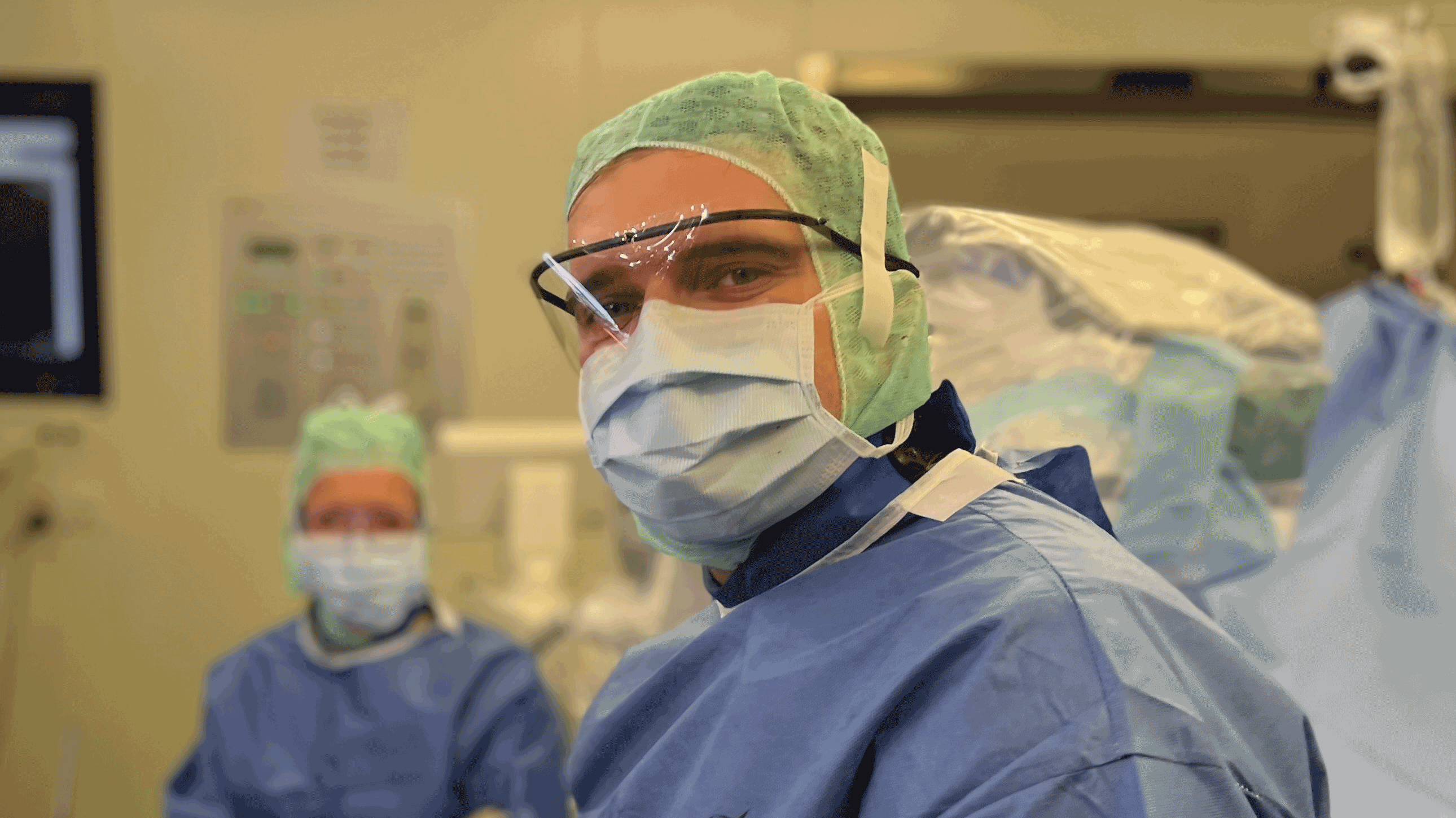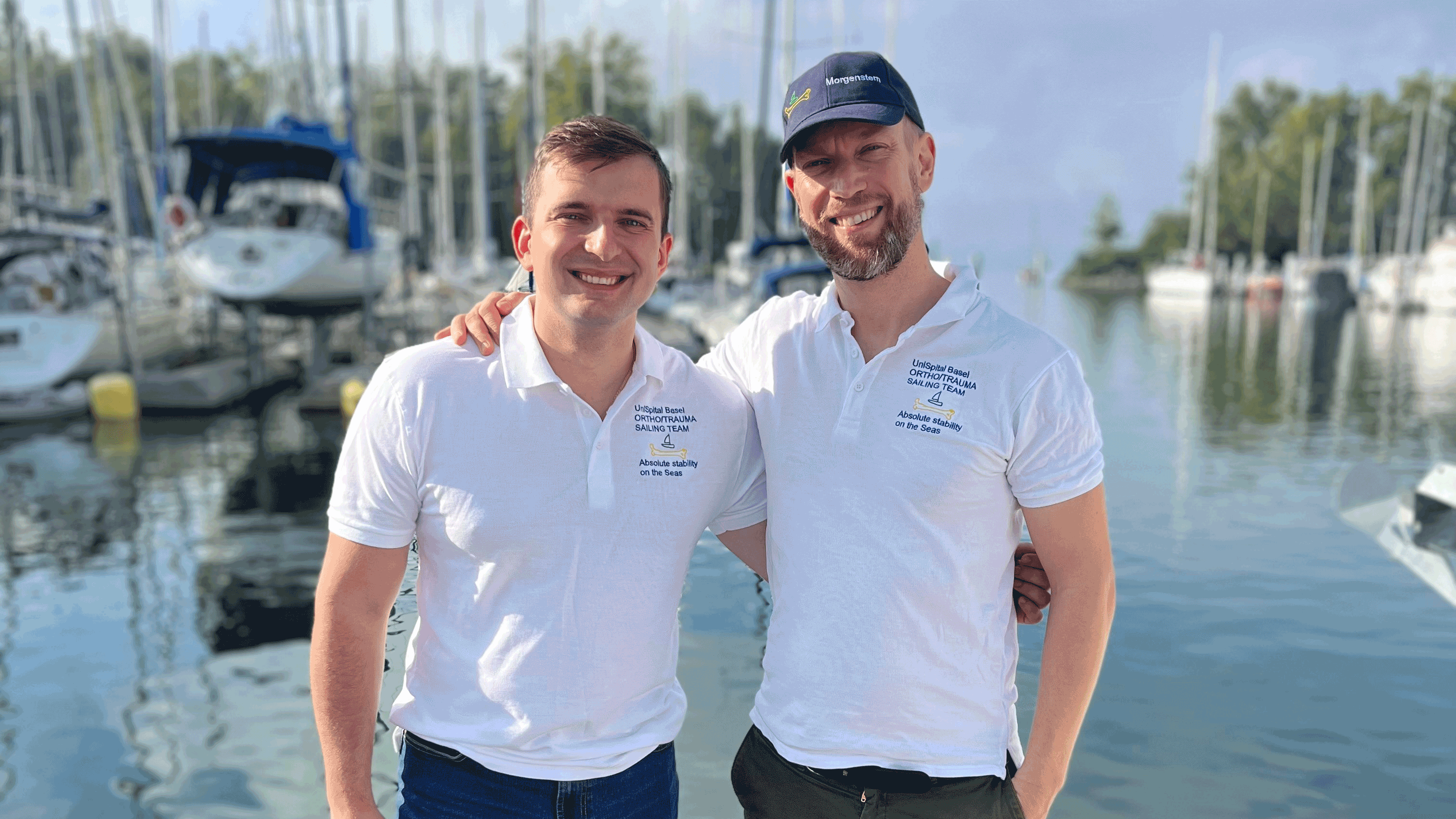AO fellow Vasyl Makhovskyi: Saving lives and limbs

30-year-old Vasyl Makhovskyi, an orthopedic surgeon at Ternopil Regional Hospital in western Ukraine, finally got the chance to embark on his long-awaited AO fellowship at Universitätsspital Basel’s Center for Musculoskeletal Infections in Summer 2023. The route to his fellowship was all but plain sailing, even though it did eventually include a sailing competition.
“I had been waiting for this opportunity for years. The first couple of times, my application was turned down, and when I finally got accepted in early 2020, my fellowship was postponed because of the COVID-19 pandemic.”
Makhovskyi’s interest in musculoskeletal infections had been sparked years earlier when he participated in an AO Trauma basic principles course in Kyiv and later attended a seminar held by Prof Olivier Borens from Lausanne. Olexandr Rikhter, president of AO Trauma Ukraine, then encouraged the young surgeon to try for an AO fellowship. “My chief in Ternopil, Serhiy Hariyan, had introduced me to the AO world and taught me according to the AO principles from the very beginning. I wanted to become an expert in the field of fracture-related infections and waited in anticipation for every new article that was published in this area. An AO fellowship is a unique opportunity to obtain specific knowledge and skills from the world’s most renowned experts in the field.”
When his fellowship finally got the go-ahead after the pandemic, Makhovskyi was facing a new problem. His home country, Ukraine, was being invaded, and the hospital he works at, formerly a civilian tertiary referral trauma center, had been turned into a military hospital treating battlefield injuries. His first reaction was to turn down the fellowship altogether, but the new challenges he was facing changed his mind.
“All of a sudden, we had to tackle injuries we had never seen before. Moreover, we quickly realized the infectious complication rates associated with these injuries were unprecedentedly high, threatening patients’ lives and limbs. It became clear to me that I could not achieve good results without acquiring specific knowledge and skills in musculoskeletal infections management, so I decided to not let this opportunity pass and began my nine-week fellowship in Basel in July 2023.”
To complicate matters even more, Makhovskyi not only had to apply for special permission from the Ukrainian ministry of health to travel abroad—under martial law, all men of conscription age are banned from leaving the country—he also had to leave behind his heavily pregnant wife. “Luckily, my little daughter was very patient and postponed her delivery until daddy was back home.”
Mario Morgenstern, one of Makhovskyi’s supervisors in Basel, is full of praise for the young Ukrainian: “From day one, he was never not there. He was always fully committed and keen to learn as much as he could. Vasyl was always the first one in and the last one out. It was not until his fifth week at the clinic, when we gave him a day pass for the Swiss railway, that he dared to take a day off and explore the country.”
Makhovskyi is happy to return the praise: “I always felt free to ask questions and always received honest and comprehensive answers. Circular frame fixation was one of the most relevant techniques for my practice that I learned during my fellowship. It’s the mainstay of treatment in the management of severe open injuries and infection complications to the lower limb and not part of the normal medical training. Thanks to Mario Morgenstern, it’s now a valuable technique in my toolbox. He made every effort to explain and teach me all the tips and tricks on preoperative planning, preassembling of the circular frames, and the operative technique itself.”
Despite now being well-trained in his new skills, Makhovskyi has been facing many additional complications in his daily work since returning to Ukraine. “Battlefield trauma is associated with massive soft tissue and bony defects, severe contamination, and a high frequency of infectious complications that may threaten the survival of the wounded and endanger viability of the limb as well as restoration of its function.” Many of his colleagues experience burnout symptoms, and with the high number of patients all arriving at once, difficult decisions must be taken regarding priority. The high momentary caseload also means that materials run out quickly, and there are often not enough fixators available to treat all those in need.
Nevertheless, Makhovskyi tries to keep a positive attitude and wants to expand his knowledge even further to help those who require reconstructive surgery: “The problem of severe open injuries and their associated infectious complications is multifold, and a multidisciplinary approach is the key to success in their management. It requires coordinated teamwork of the orthopedic surgeon, plastic and vascular surgeons, infectious disease specialists, microbiologists, clinical pharmacologists, and many others, depending on the specifics of the case. Unfortunately, reconstructive plastic surgery is currently not readily available in my institution or in my country overall, but the demand is exceptionally high. Our orthopedic surgeons were forced to learn how to perform local soft tissue reconstruction themselves. From this perspective, my fellowship was productive as well—I was able to connect with colleagues from the reconstructive plastic surgery team in Basel, who provided me with deep insights into how to plan and perform soft tissue reconstruction with limited resources.”During his fellowship, Makhovskyi also had the opportunity to visit the AO Center Davos and give a presentation on battlefield injuries as part of this year’s Summer School “Bone and joint infections: from basic research to clinical practice”, a collaborative project of Basel’s Center for Musculoskeletal Infections and the AO Research Institute Davos. Even though he was in Switzerland to learn and practice, he also enjoyed some memorable leisurely moments with the team in Basel: “I was fortunate to be involved in several team building occasions. The most memorable one was a sailing competition on the Bodensee, in which we sailed under the motto “absolute stability on the seas.” I have never participated in anything like this before and will always cherish this special memory.”
Since returning to Ukraine, Makhovskyi has been involved in organizing several courses on battlefield injuries held by AO Trauma Ukraine. Despite the dangers and complications, these are held as in-person events whenever possible, and international experts join online to give presentations and seminars. Makhovskyi is proud to have secured his mentor Mario Morgenstern’s participation during the most recent of these courses. And he remains determined in his mission: “Saving lives and limbs.”
You might also be interested in:
- The AO’s disaster-response resources
- The AO Research Institute Davos’ groundbreaking research on fracture-related infections
- Learning more about AO Trauma’s offerings
- Fellowship opportunities with AO Trauma


